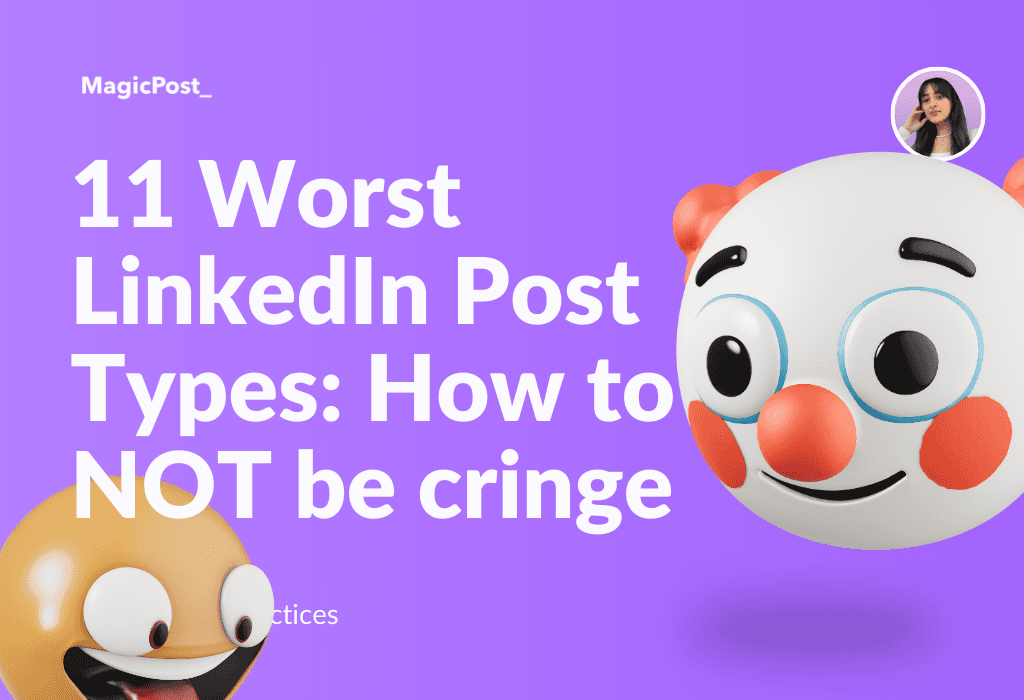Tool Reviews

Yasmina Akni Ebourki
Last updated: Oct 28, 2024
If you're like me, you've probably heard people talk about scraping a thousand times but still have no clue what it is or how to do it.
Don’t worry, we have all been there too.
Let me guide you through everything you need to know about scraping, what to consider before getting started, and the best tools available for using it on LinkedIn.
TL;DR: LinkedIn scraping is a technique used to extract data from public profiles for lead generation. While it’s useful, scraping must be done in compliance with LinkedIn's terms to avoid account restrictions. Tools like Phantombuster, TexAu, and Octoparse can automate the process.
What is LinkedIn Scraping?
Scraping is a technique used to extract information from a website to be used elsewhere or in a different context.
It involves retrieving the HTML content of a webpage and applying filters to gather the specific data you need.
But why is scraping useful for LinkedIn?
For example, if you're interested in a particular business or industry, scraping allows you to extract data from LinkedIn profiles of individuals in that niche who could be potential clients.
This gives you access to their names and LinkedIn profiles, enabling you to target individuals who have already shown interest in the market you're focused on.
The benefits are numerous, including smarter prospecting, gaining valuable insights on your competitors, and staying updated on social media trends and information.
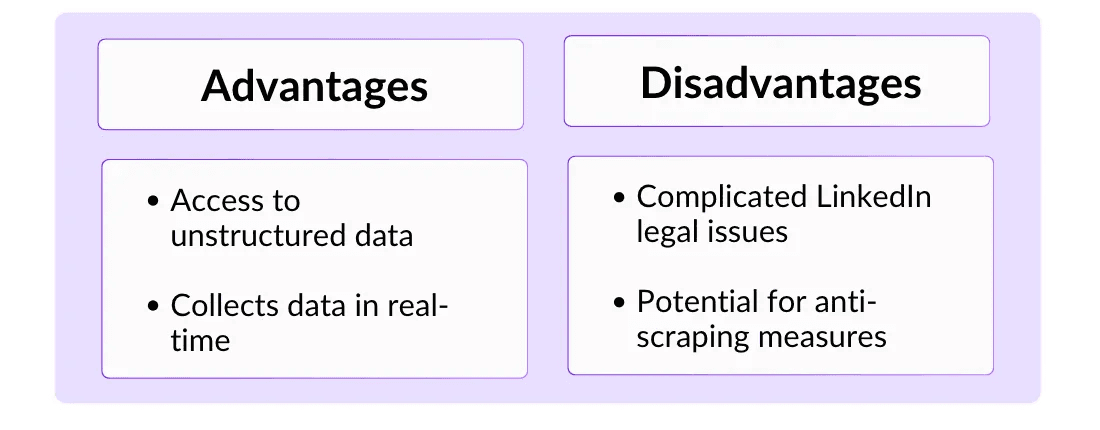
How Does It Help with Lead Generation?
For salespeople or affiliate marketers, finding the right profiles is essential for success.
Scraping offers a way to generate high-quality leads by extracting relevant data, although it’s important to ensure that your methods comply with legal guidelines.
So, how exactly does scraping help you find potential clients?
First, it identifies the sources you want to target.
This means locating your ideal clients—whether on websites, social media platforms, or other networks. Once identified, scraping extracts the necessary data from these pages.
After compiling your list, you can analyze it to ensure its quality.
From there, you can manually reach out to leads or automate the process to increase efficiency.
Is LinkedIn Scraping Legal and What Are the Risks?
It may sound too good to be true, so the big question is: is this legal?
The answer isn’t straightforward.
While the information you’re extracting from LinkedIn typically comes from public profiles, which are accessible to anyone, LinkedIn’s terms of service explicitly prohibit scraping.
Specifically, LinkedIn states that users should not “copy profiles and information of others through any means.”
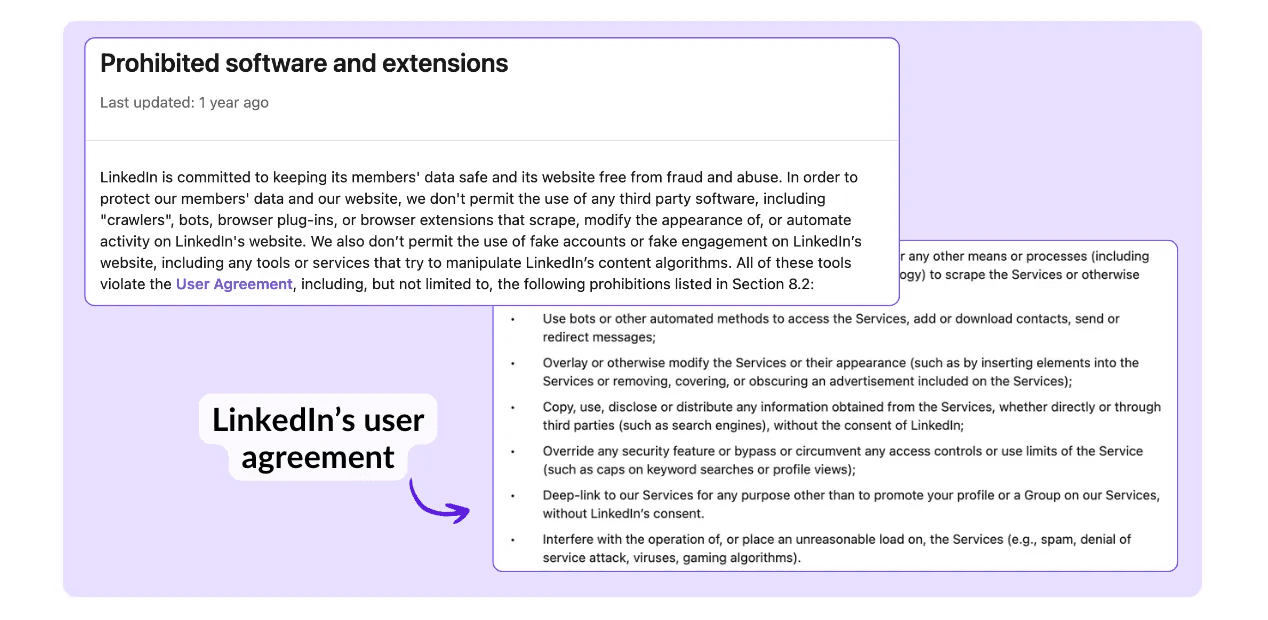
Even though scraping public profiles might seem legal, how you use that data can have serious consequences.
For instance, if you use it primarily for spamming, you’ll likely run into problems.
However, if you use the data responsibly and in line with LinkedIn’s user agreement, you may avoid trouble.
LinkedIn also requires you to notify individuals before using their email for commercial purposes. If someone opts out, they have the right to refuse.
In summary, while scraping is technically against LinkedIn’s terms, it remains a common practice among businesses. It’s a legal grey area, and the key is using the data ethically and responsibly.
Before engaging in scraping, it’s crucial to review LinkedIn’s terms of service and stay within the rules.
Always approach scraping cautiously, as LinkedIn has taken action against companies involved in the practice.
Also, be aware that LinkedIn doesn’t favor most extensions that connect to its platform.
Best LinkedIn Scraping Tools for Lead Generation
Now that you understand how scraping works, let’s explore some of the best tools available.
These top LinkedIn scraping tools stand out for their efficiency in collecting data, especially for lead generation.
Using these tools can help you gather valuable information, making it easier to identify and target potential clients.
Zeliq
Zeliq is an all-in-one sales prospecting platform with enrichment and omnichannel outreach. A Chrome extension lets reps add LinkedIn and Sales Navigator leads in one click, enrich emails and phone numbers, and drop prospects straight into automated sequences across email, calls, and LinkedIn. The idea is to move from “found a profile” to multichannel outreach without copying and pasting between tools.
For teams, this means fewer separate subscriptions for data, enrichment, and sequencing, plus a clear view of credits and performance in one place. The trade-offs most often mentioned are a learning curve, some interface complexity, and the fact that advanced use (high credits, team features) quickly pushes you onto paid tiers.
Pricing starts at $59 per user/month for the Starter plan + a free plan.
Phantombuster
One of the most well-known tools is Phantombuster, an automated platform that enables web scraping and automates various processes.
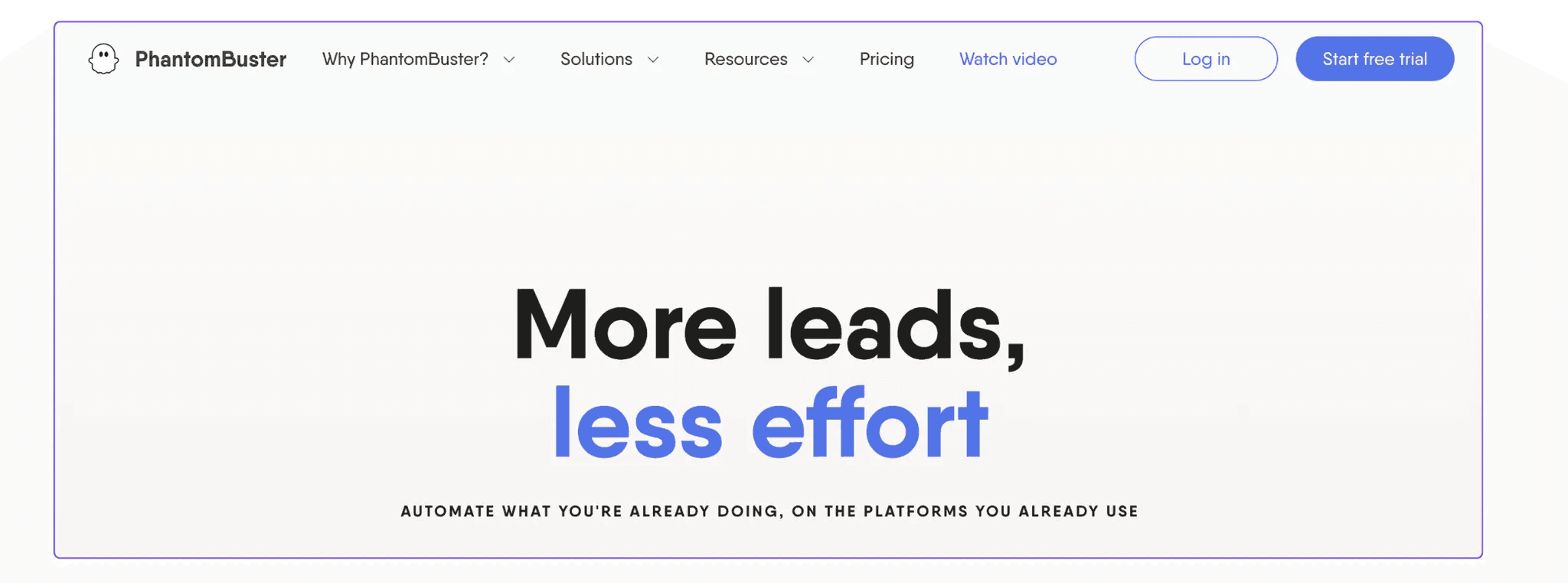
Phantombuster not only gathers lists of data and users but also automates tasks like connection requests and sending the initial message to your targeted audience.
This is a game-changer for sales teams, as it streamlines lead generation.
Plus, it integrates seamlessly with LinkedIn and LinkedIn Sales Navigator.
However, like many tools in this category, Phantombuster comes with a cost.
The pricing starts at $60 per month for the Starter plan, $137 for the Professional plan, and goes up to $375 for the Team package.
It’s worth noting that Phantombuster offers a short trial, allowing 2 hours per day with 50 email credits for 14 days.
Despite its limitations, Phantombuster remains one of the leading tools on the market for LinkedIn scraping.
TexAu
The second tool that has gained a strong reputation for its effectiveness in LinkedIn scraping is TexAu.
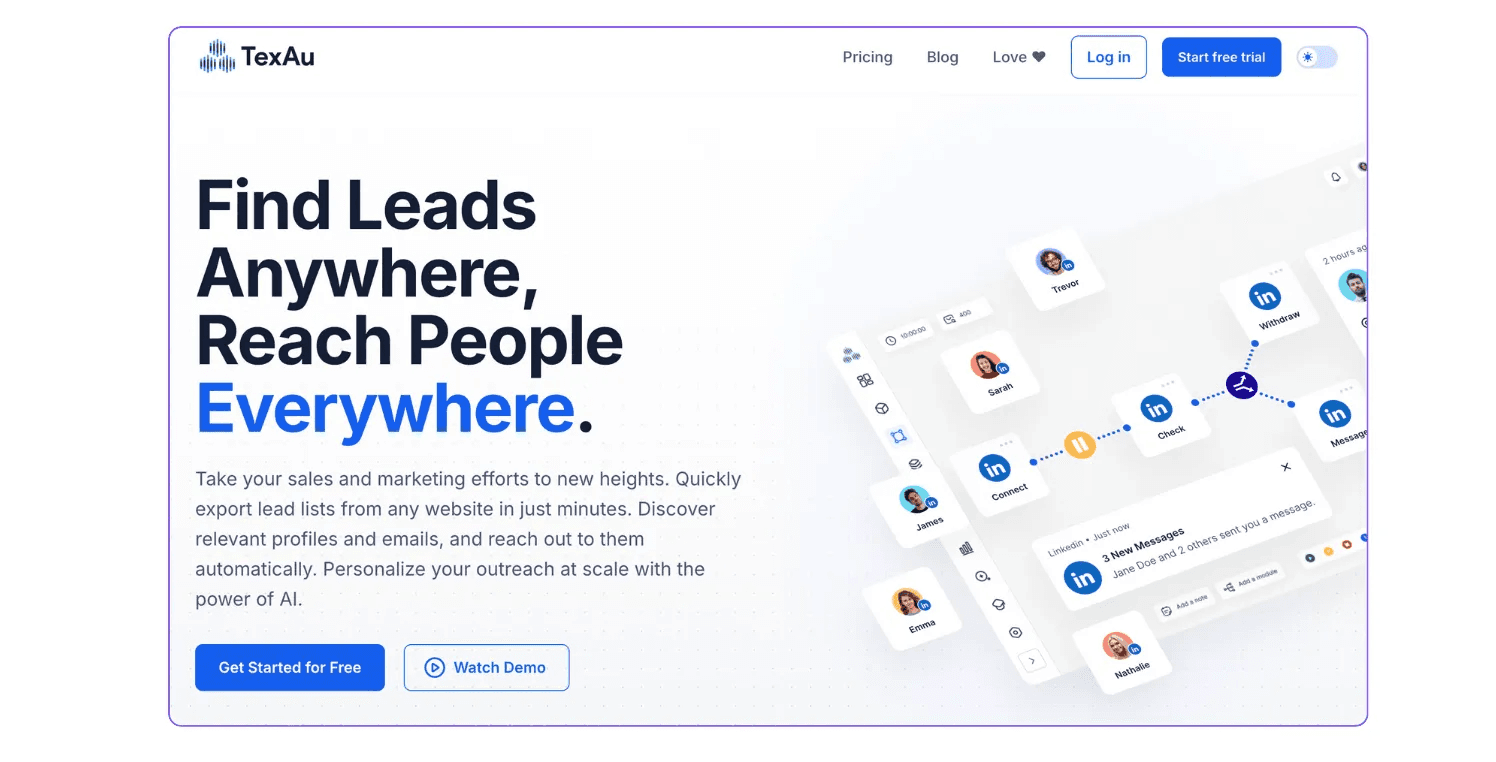
TexAu not only enables you to scrape LinkedIn, but it also supports email automation and allows you to connect different modules for advanced customization.
One of its key advantages is the library of templates that you can easily adapt to meet your specific scraping needs, making it easier to filter data or send emails efficiently.
However, similar to Phantombuster, TexAu is not free.
In fact, it starts at $79 per month for the basic plan, $199 for team access, and $459 for agency-level use.
Octoparse
Finally, the third tool designed for scraping is Octoparse.
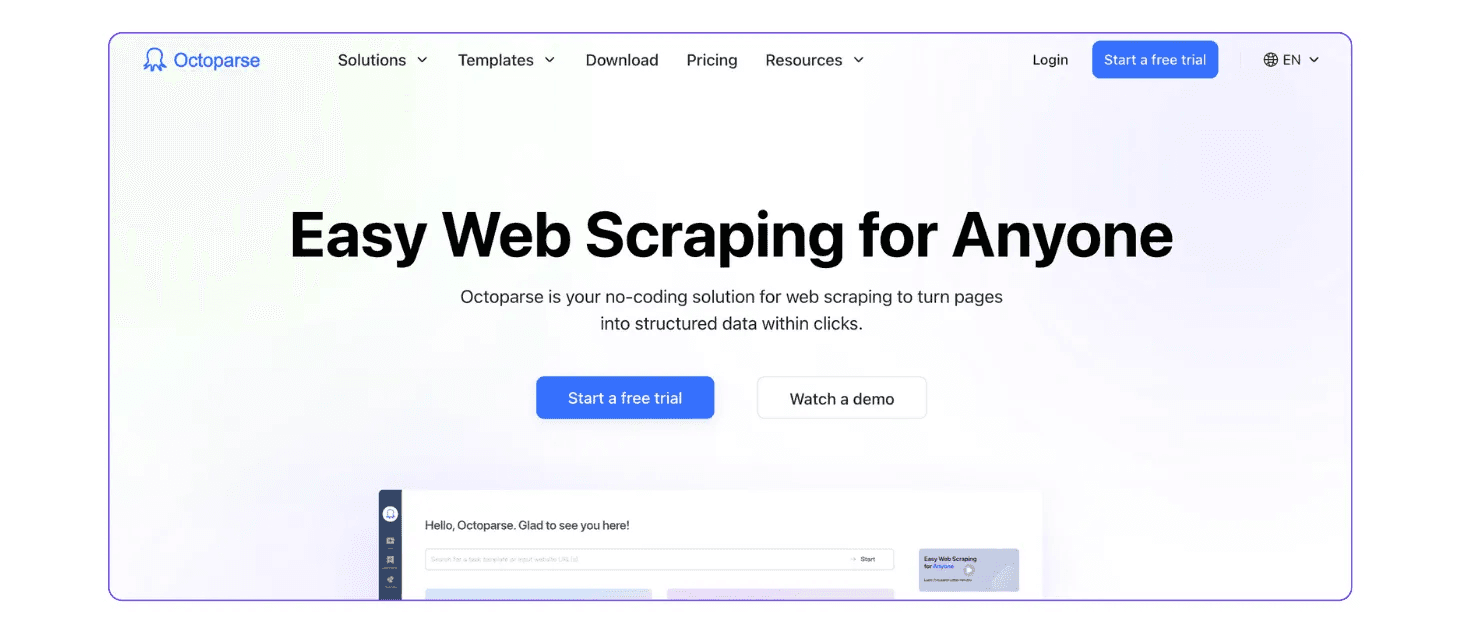
Like the other tools, it allows you to extract data, download the information or content you're interested in, and set up automated systems to contact your leads.
In terms of functionality, it’s quite similar to Phantombuster and TexAu. However, Octoparse stands out a bit in pricing.
It offers a free plan with 10 tasks and up to 10K lines of data exports.
After that, the paid plans start at $99 per month for the Standard plan, and $249 per month for the Professional plan, which offers the most complete features.
Best Practices for LinkedIn Scraping
Now that you understand LinkedIn scraping and how to implement it, keep a few key practices in mind to avoid getting your account blocked and to use this method responsibly.
Be ethical with the data: Remember that collecting data comes with responsibilities. Be mindful of how you plan to use the information. Avoid spamming or scraping irrelevant profiles, and always target the right audience to save time and resources.
Use only public information: Scrape only publicly available data. Stick to the information users have shared on the public side of their profiles and avoid any restricted or private information.
By following these guidelines, you can minimize risks and use LinkedIn scraping in a way that benefits both you and your potential clients.
Avoiding Detection and Staying Compliant with LinkedIn Policies
With this in mind, it’s crucial to exercise caution, as LinkedIn can block your account if it detects large-scale scraping activities.

Here are some tips to help you avoid detection and stay compliant with LinkedIn policies:
Limit Your Activity: Don’t perform scraping at an excessive rate. Scraping too much data in a short period is a red flag for LinkedIn. Try to mimic human behavior by pacing your activity.
Use Trusted Tools: Ensure that the tools you use are reputable and have safety measures in place to prevent detection. Some scraping tools offer options to randomize requests and reduce the likelihood of being flagged.
Stay Updated on LinkedIn Policies: LinkedIn is constantly updating its terms of service. Make sure you’re always aware of the latest rules to avoid unintentional violations.
Respect User Privacy: Always follow ethical guidelines by respecting user privacy and only using publicly available data.
By staying compliant with these practices, you can reduce the risk of getting blocked while continuing to leverage LinkedIn scraping effectively.
Using Scraped Data Effectively for Lead Nurturing
To successfully generate quality leads, it requires a blend of strategies, having a solid plan and utilizing effective techniques to identify the right prospects.
It starts with proper segmentation of your leads.
Organize them based on criteria such as job role, industry, or demographics. Initially, you can manually create this segmentation by researching and analyzing various profiles.
Once your data is organized, craft personalized outreach messages that resonate with each group’s specific needs or pain points.
Another key aspect is to avoid generic communication; instead, tailor your content to clearly demonstrate how your product or service addresses their unique challenges.
In addition, your LinkedIn profile should consistently offer valuable and relevant content for your audience.
If time is a constraint, consider using external tools like MagicPost to streamline the process of writing posts.
By effectively combining thoughtful lead nurturing with your scraped data, you'll convert prospects into engaged connections and ultimately, loyal clients.
How Do I See My Posts on LinkedIn: Easy Steps for Beginners
LinkedIn can feel like a labyrinth at times. Here’s a handy guide to finding your posts: Log in to LinkedIn, go to your profile, and scroll to the…
Last update: Feb 13, 2026
11 Best AI Linkedin Post Generator (2026)
11 AI LinkedIn post generators in 2026 to create scroll-stopping content, publish consistently, and grow your audience faster.
Last update: Feb 9, 2026
8 Ways to Bring Real Value on LinkedIn
Learn how to create valuable LinkedIn posts that educate, engage, and build trust. Discover practical tips, visuals, timing, and common mistakes to avoid.
Last update: Feb 6, 2026
How to Increase Impressions on LinkedIn: A Comprehensive Guide
Increase your LinkedIn impressions with tips on content creation, visual engagement and more. Focus on value and watch your LinkedIn presence grow!
Last update: Feb 6, 2026
How to Publish Using a Viral Post Generator
Discover how a Viral LinkedIn Post Generator can help you create high-performing LinkedIn content, increase visibility, and drive engagement with ease.
Last update: Feb 5, 2026
Top 10 Benefits of Using LinkedIn
Explore how LinkedIn boosts your career and business. Discover its unique benefits for networking, lead generation to personal branding.
Last update: Jan 27, 2026
Top 11 Worst LinkedIn Post Types
A sharp, funny breakdown of the most common LinkedIn post archetypes, from oversharers to opportunists and why they keep taking over your feed.
Last update: Jan 21, 2026






